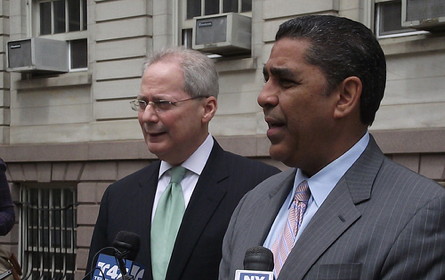
Photo by azipaybarah
State Sen. Adriano Espaillat, after conceding for a second time to U.S. Rep. Charles Rangel in the race for the 13th Congressional District, said there were still questions to be asked about the election.
But the biggest one of all, so to speak, concerned the agency that runs the vote counting machine in the city.
"This is sort of the elephant in the room. Is the Board of Elections a reliable entity? I feel not,” Espaillat said to reporters yesterday as he announced he would gracefully bow out and let Rangel keep his seat.
He said he expected other groups to look into problems that occurred during the election. "You know, from the changing of election district numbers, to some change in poll sites to perhaps a lack of proper notification to voters and a bunch of other things," he added.
It had been a strange trip to get to this repeat concession by Espaillat. Nearly two weeks have passed since the chaotic election night that initially saw Rangel reported as the clear victor in the June 26 primary. Initial vote tallies put Rangel thousands of votes ahead of Espaillat, and the challenger conceded.
However, new votes were soon discovered and Rangel's lead shrank – at one point down to only 802 votes. Both candidates said the race was too close to call. Espaillat filed a lawsuit alleging widespread voter fraud. But over the weekend, after paper ballots were counted, the BOE announced Saturday that Rangel had won out with a margin of 990 votes.
Chaos is nothing new for elections in the city. The last major elections saw initial vote tallies vary wildly from later counts.
“People are getting used to this chaos, but not in a good way. It reduces the faith people have in the integrity of our elections, it temporarily skews the results," said state Assemblyman Brian Kavanagh, who has sponsored legislation that would streamline election night processes and could avert future debacles like the one seen during this most recent primary.
"We live in a culture where people expect real results right away, campaigns make decisions based on them," he continued. "It looks like Espaillat made a decision based on them and it was based on the wrong information.”
If Kavanagh had his way, his bill would have passed both houses of the Legislature and would have been in place for the September primaries. But it was frozen in the Senate, where it is sponsored by state Sen. Marty Golden. Kavanagh says he doubts the Legislature will return and pass the bill in time for it to affect the upcoming elections.
BOE employees currently tally election night data by hand – using scissors, paper, pencils and calculators to tabulate the votes -- even though the voters are taken on electronic machines.
Councilwoman Gale Brewer, who has been an adamant supported of Kavanagh's legislation, said at a recent BOE hearing that the answer is so simple that not implementing on it borders on the absurd. “To take a memory stick out of the scanner and take it to another computer and run the numbers …. It’s very hard for the public to understand we’re still not doing this.”
Some policy observers believe that even without legislation, the Board of Election could move forward administratively and change the process of election night vote reporting.
“We think the attorney general's office and the state BOE should weigh in on the city's ability to change closing its closing procedures," said Alex Camarda, director of public policy and advocacy for Citizens Union, the sister organization of the Gazette's publisher.
It isn't just the Board of Election's counting methods that have come into question in the last few weeks.
The New York Daily News also reported that Rangel's representatives met with a representative of the board the weekend before the election.
The board claimed it was a routine meeting but Espaillat's camp denied getting the same personal service. Assemblyman Michael Benjamin, who supports Kavanagh's election-night closing bill, wrote in a New York Post op-ed on July 5th that he thinks the board is staffed by “B team talent” because of “political patronage.”
“From its top managers all the way down to the Election Day poll workers — the public face of the agency — everyone at the Board is a political appointee,” Benjamin wrote.
The assemblyman advocates putting the BOE in the hands of the mayor. In that situation, Benjamin would have the City Council approve the appointments of any chief clerk, executive director or deputy executive director.
Benjamin's proposal would require a major legislative overhaul -- something that will not happen before the November elections. But most lawmakers are not optimistic that anything will change soon enough.
“I expect we will be in a similar situation with some of the same stuff playing out during the September primaries,” Kavanagh said.